sensor TOYOTA YARIS 2020 (in English) User Guide
[x] Cancel search | Manufacturer: TOYOTA, Model Year: 2020, Model line: YARIS, Model: TOYOTA YARIS 2020Pages: 572, PDF Size: 7.94 MB
Page 72 of 572

72
YARIS_YARIS HATCHBACK_OM_OM99V59z_(U)
1-4. SRS Air Bags
WARNING
■Do not remove interior air bag parts
Removing any components such as the front seats, front dashboar d, the
steering wheel or parts on the front and rear window pillars an d along the
roof edge, containing air bag parts or sensors is dangerous. Th ese parts
contain essential air bag components. The air bag could accidentally acti-
vate and cause serious injuries. Always have your Toyota dealer remove
these parts.
■ Properly dispose of the air bag system
Improper disposal of an air bag or a vehicle with live air bags in it can be
extremely dangerous. Unless all safety procedures are followed, injury
could result. Have your Toyota dealer safely dispose of the air bag system
or scrap an air bag equipped vehicle.
Page 73 of 572
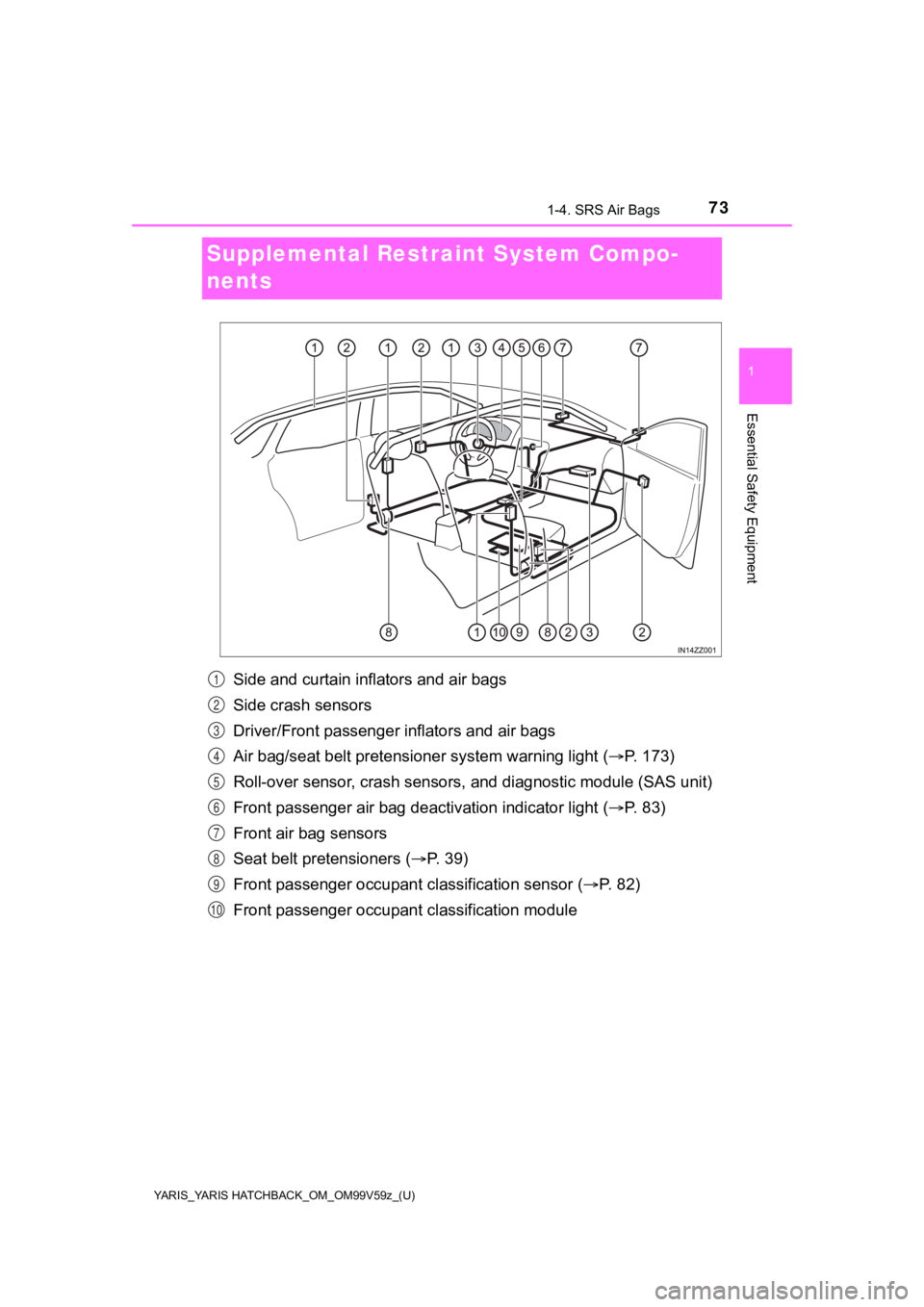
73
YARIS_YARIS HATCHBACK_OM_OM99V59z_(U)
1-4. SRS Air Bags
1
Essential Safety Equipment
Supplemental Restraint System Compo-
nents
Side and curtain inflators and air bags
Side crash sensors
Driver/Front passenger inflators and air bags
Air bag/seat belt pretensi oner system warning light ( P. 173)
Roll-over sensor, crash sensors, and diagnostic module (SAS uni t)
Front passenger air bag deac tivation indicator light (P. 8 3 )
Front air bag sensors
Seat belt pretensioners ( P. 3 9 )
Front passenger occupant c lassification sensor (P. 8 2 )
Front passenger occupant classification module1
2
3
4
5
6
7
8
9
10
Page 74 of 572
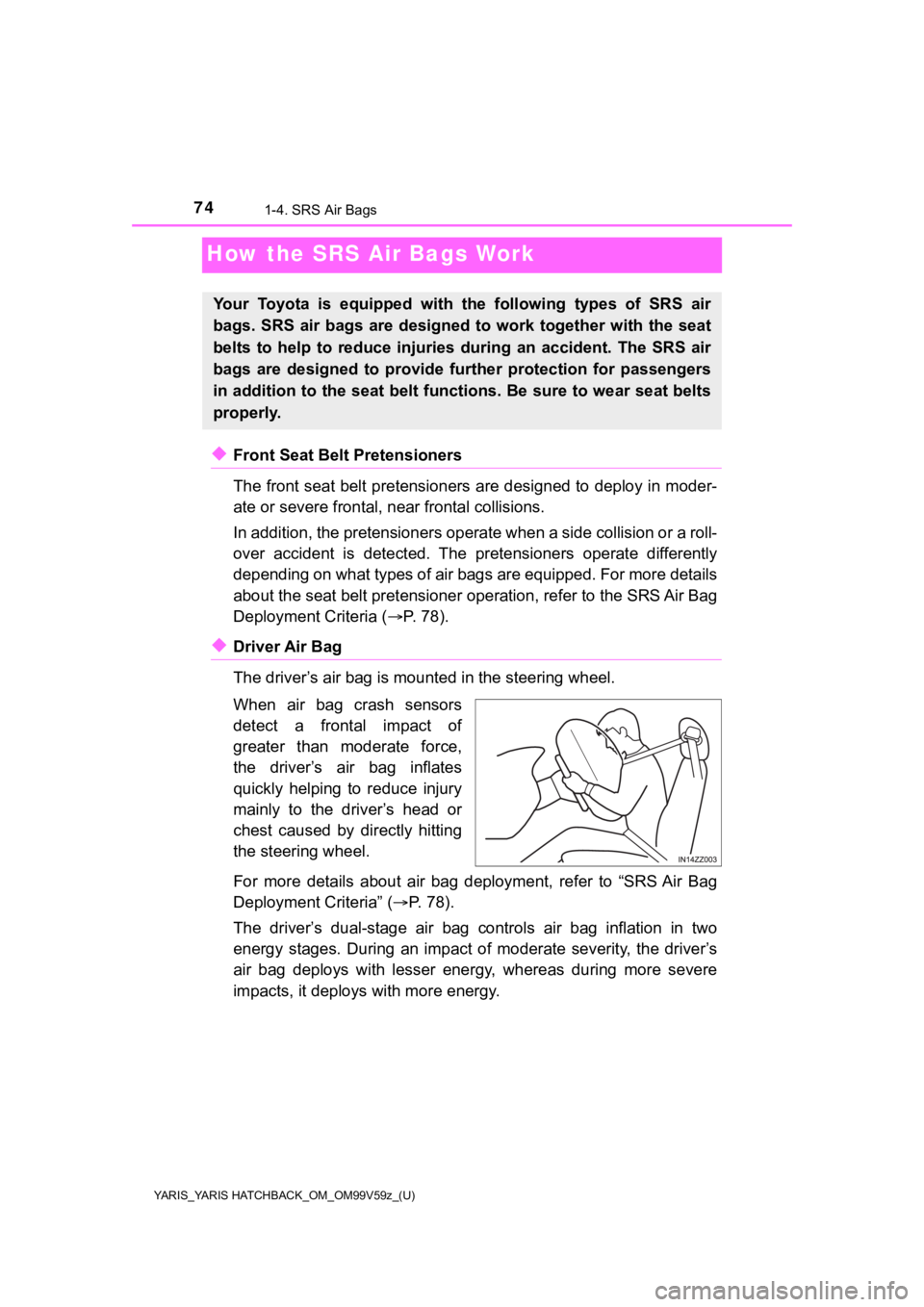
74
YARIS_YARIS HATCHBACK_OM_OM99V59z_(U)
1-4. SRS Air Bags
How the SRS Air Bags Work
◆Front Seat Belt Pretensioners
The front seat belt pretensioners are designed to deploy in moder-
ate or severe frontal, near frontal collisions.
In addition, the pretensioners o perate when a side collision or a roll-
over accident is detected. The p retensioners operate differently
depending on what types of air bags are equipped. For more deta ils
about the seat belt pretensioner operation, refer to the SRS Ai r Bag
Deployment Criteria ( P. 7 8 ) .
◆Driver Air Bag
The driver’s air bag is mounted in the steering wheel.
When air bag crash sensors
detect a frontal impact of
greater than moderate force,
the driver’s air bag inflates
quickly helping to reduce injury
mainly to the driver’s head or
chest caused by directly hitting
the steering wheel.
For more details about air bag deployment, refer to “SRS Air Ba g
Deployment Criteria” ( P. 7 8 ) .
The driver’s dual-stage air bag controls air bag inflation in t wo
energy stages. During an impact of moderate severity, the driver’s
air bag deploys with lesser energy, whereas during more severe
impacts, it deploys with more energy.
Your Toyota is equipped with the following types of SRS air
bags. SRS air bags are designed to work together with the seat
belts to help to reduce injuries during an accident. The SRS ai r
bags are designed to provide further protection for passengers
in addition to the seat belt functions. Be sure to wear seat be lts
properly.
Page 75 of 572
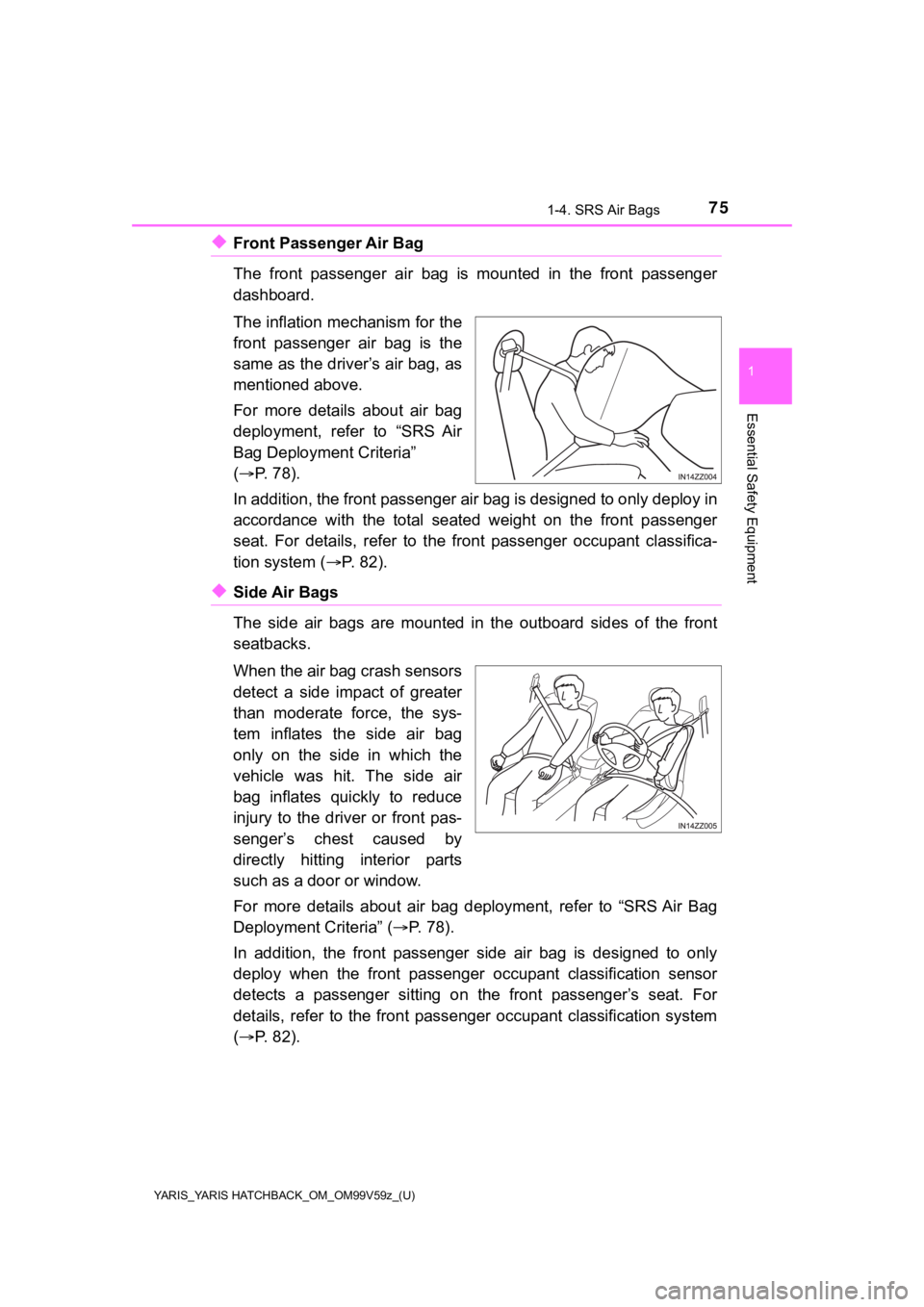
YARIS_YARIS HATCHBACK_OM_OM99V59z_(U)
751-4. SRS Air Bags
1
Essential Safety Equipment
◆Front Passenger Air Bag
The front passenger air bag is mounted in the front passenger
dashboard.
The inflation mechanism for the
front passenger air bag is the
same as the driver’s air bag, as
mentioned above.
For more details about air bag
deployment, refer to “SRS Air
Bag Deployment Criteria”
( P. 78).
In addition, the front passenger air bag is designed to only de ploy in
accordance with the total seated weight on the front passenger
seat. For details, refer to the front passenger occupant classi fica-
tion system ( P. 8 2 ) .
◆Side Air Bags
The side air bags are mounted in the outboard sides of the fron t
seatbacks.
When the air bag crash sensors
detect a side impact of greater
than moderate force, the sys-
tem inflates the side air bag
only on the side in which the
vehicle was hit. The side air
bag inflates quickly to reduce
injury to the driver or front pas-
senger’s chest caused by
directly hitting interior parts
such as a door or window.
For more details about air bag deployment, refer to “SRS Air Ba g
Deployment Criteria” ( P. 7 8 ) .
In addition, the front passenger side air bag is designed to on ly
deploy when the front passenger occupant classification sensor
detects a passenger sitting on the front passenger’s seat. For
details, refer to the front pas senger occupant classification s ystem
( P. 82).
Page 76 of 572
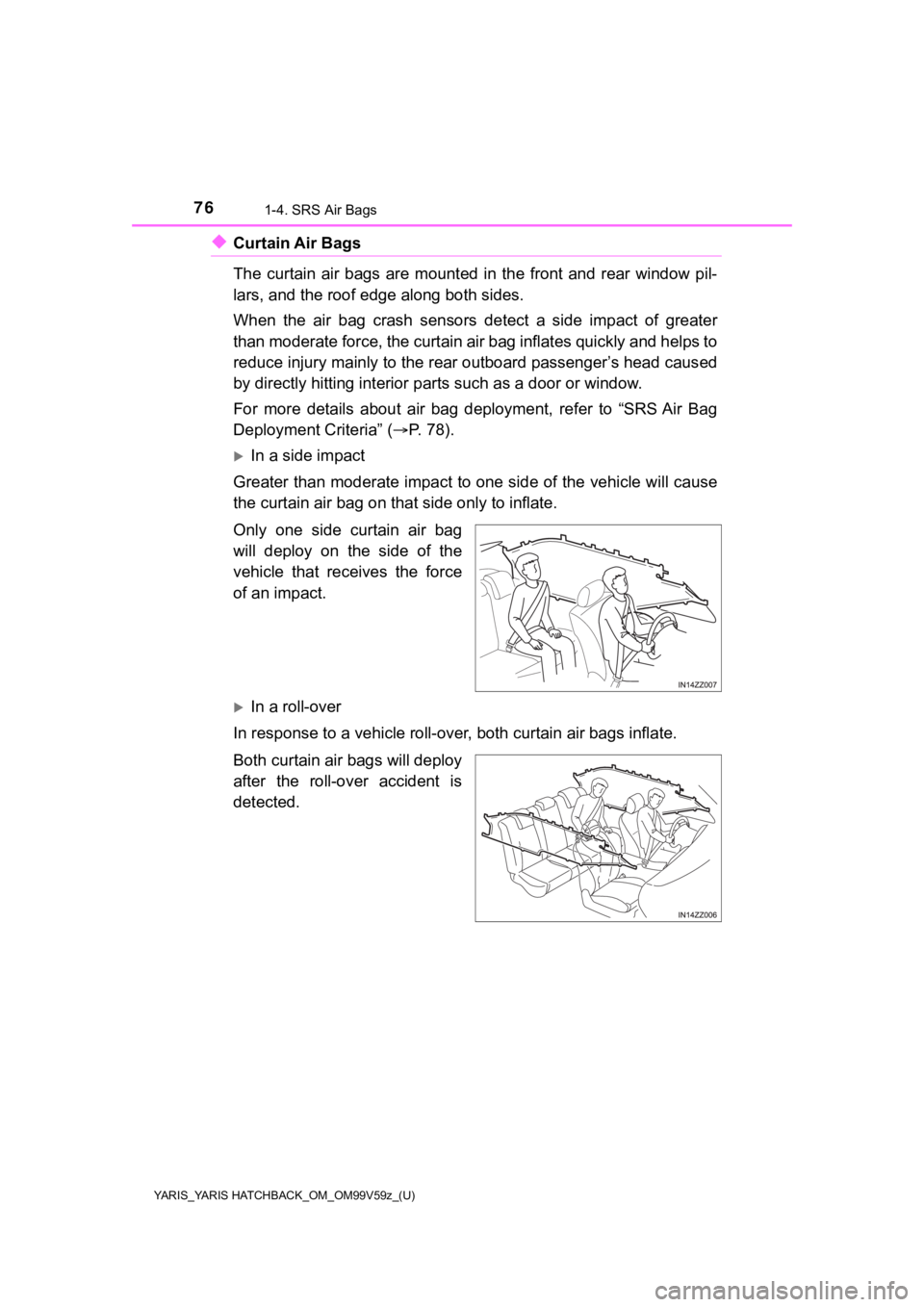
76
YARIS_YARIS HATCHBACK_OM_OM99V59z_(U)
1-4. SRS Air Bags
◆Curtain Air Bags
The curtain air bags are mounted in the front and rear window pil-
lars, and the roof edge along both sides.
When the air bag crash sensors detect a side impact of greater
than moderate force, the curtain air bag inflates quickly and h elps to
reduce injury mainly to the rear outboard passenger’s head caus ed
by directly hitting interior p arts such as a door or window.
For more details about air bag deployment, refer to “SRS Air Ba g
Deployment Criteria” ( P. 7 8 ) .
In a side impact
Greater than moderate impact to one side of the vehicle will ca use
the curtain air bag on that side only to inflate.
Only one side curtain air bag
will deploy on the side of the
vehicle that receives the force
of an impact.
In a roll-over
In response to a vehicle roll-over , both curtain air bags inflate.
Both curtain air bags will deploy
after the roll-over accident is
detected.
Page 79 of 572

YARIS_YARIS HATCHBACK_OM_OM99V59z_(U)
791-4. SRS Air Bags
1
Essential Safety Equipment
X: The SRS air bag equipment is designed to deploy in a collision.
*1:The front passenger front and side air bags and the seat belt pretensioner
are designed to deploy when the front passenger occupant classi fication
sensor detects a passenger sitting on the front passenger’s sea t.
*2:In a side collision, the seat belt pretensioners and the side/curtain air bags
deploy.
*3:In a roll-over accident, the seat belt pretensioners and the cu rtain air bags
deploy.
In a frontal offset collision, the equipped air bags and preten sioners may all
deploy depending on the direction, angle, and rate of impact.
Page 82 of 572

82
YARIS_YARIS HATCHBACK_OM_OM99V59z_(U)
1-4. SRS Air Bags
Front Passenger Occupant Classification
System
Your vehicle is equipped with a f ront passenger occupant classifica-
tion sensor as a part of the supplemental restraint system. Thi s sen-
sor is equipped in the front pas senger’s seat cushion. This sensor
measures the electrostatic capacity of the front passenger’s se at. The
SAS unit is designed to prevent the front passenger front and side air
bags and seat belt pretensioner system from deploying if the front
passenger air bag deactivation indicator light turns on.
To reduce the chance of injuries caused by deployment of the front
passenger air bag, the system deactivates the front passenger f ront
and side air bags and also the seat belt pretensioner system wh en the
front passenger air bag deactivat ion indicator light turns on. Refer to
the following table for the front passenger air bag deactivatio n indica-
tor light illumination conditions.
This system shuts off the front p assenger front and side air bags and
seat belt pretensioner system, s o make sure the front passenger air
bag deactivation indicator light turns on according to the foll owing
table.
The air bag/front seat belt pretensioner system warning light f lashes
and the front passenger air bag deactivation indicator light il luminates
if the sensors have a possible ma lfunction. If this happens, the front
passenger front and side air bags and seat belt pretensioner sy stem
will not deploy.
First, please read “Supplemental Restraint System (SRS) Pre-
cautions” ( P. 66) carefully.
Front Passenger Occupant Classification Sensor
Page 83 of 572
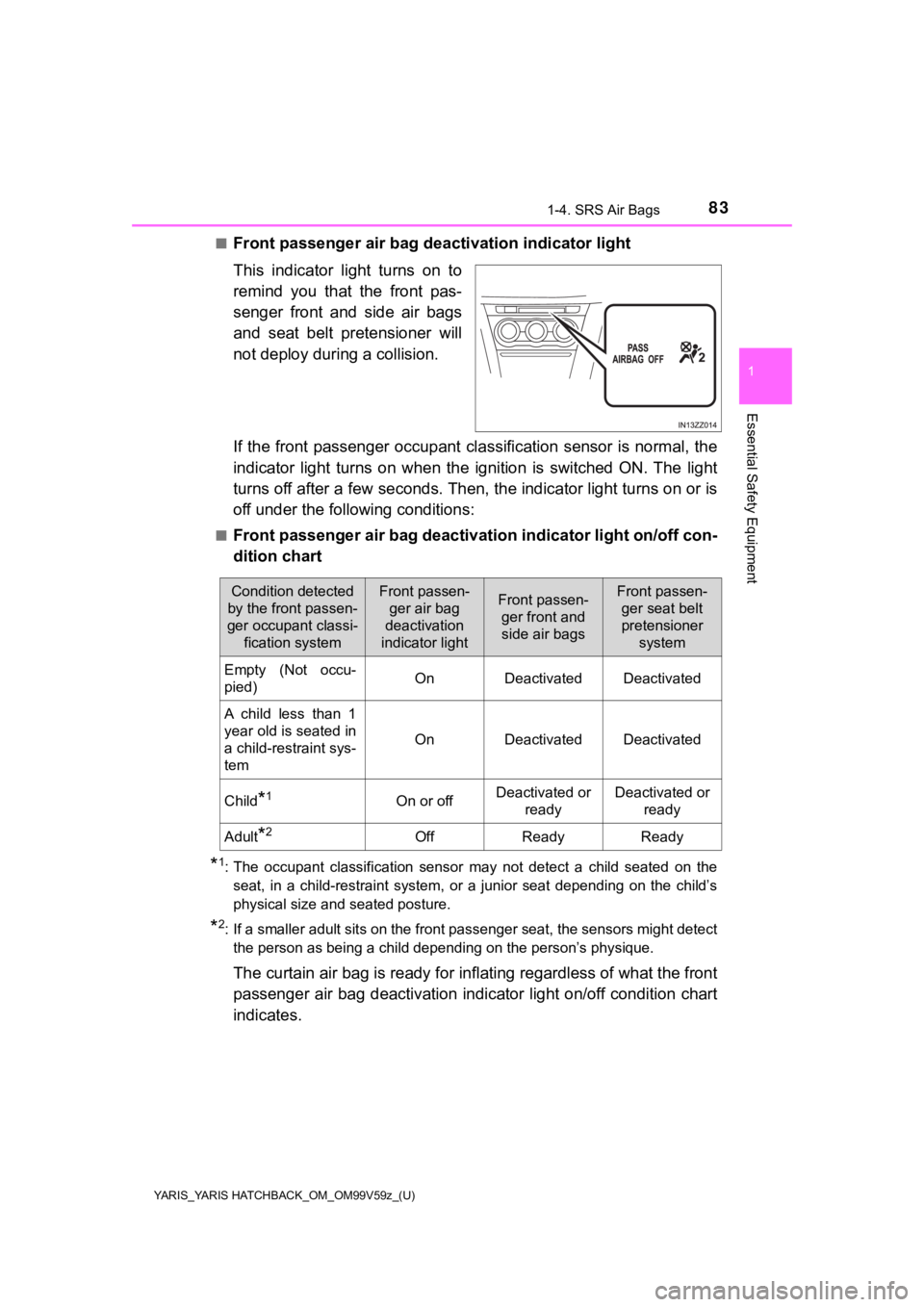
YARIS_YARIS HATCHBACK_OM_OM99V59z_(U)
831-4. SRS Air Bags
1
Essential Safety Equipment
■Front passenger air bag deactivation indicator light
This indicator light turns on to
remind you that the front pas-
senger front and side air bags
and seat belt pretensioner will
not deploy duri ng a collision.
If the front passenger occupant cl assification sensor is normal, the
indicator light turns on when the ignition is switched ON. The light
turns off after a few seconds. Then, the indicator light turns on or is
off under the following conditions:
■Front passenger air bag deactivat ion indicator light on/off con-
dition chart
*1: The occupant classification sensor may not detect a child seat ed on the
seat, in a child-restraint system, or a junior seat depending o n the child’s
physical size and seated posture.
*2: If a smaller adult sits on the front passenger seat, the senso rs might detect
the person as being a child depending on the person’s physique.
The curtain air bag is ready for inflating regardless of what t he front
passenger air bag deactivation in dicator light on/off condition chart
indicates.
Condition detected
by the front passen-
ger occupant classi-
fication systemFront passen-ger air bag
deactivation
indicator lightFront passen- ger front and
side air bagsFront passen- ger seat belt
pretensioner
system
Empty (Not occu-
pied)OnDeactivatedDeactivated
A child less than 1
year old is seated in
a child-restraint sys-
tem
OnDeactivatedDeactivated
Child*1On or offDeactivated or readyDeactivated or ready
Adult*2OffReadyReady
Page 85 of 572
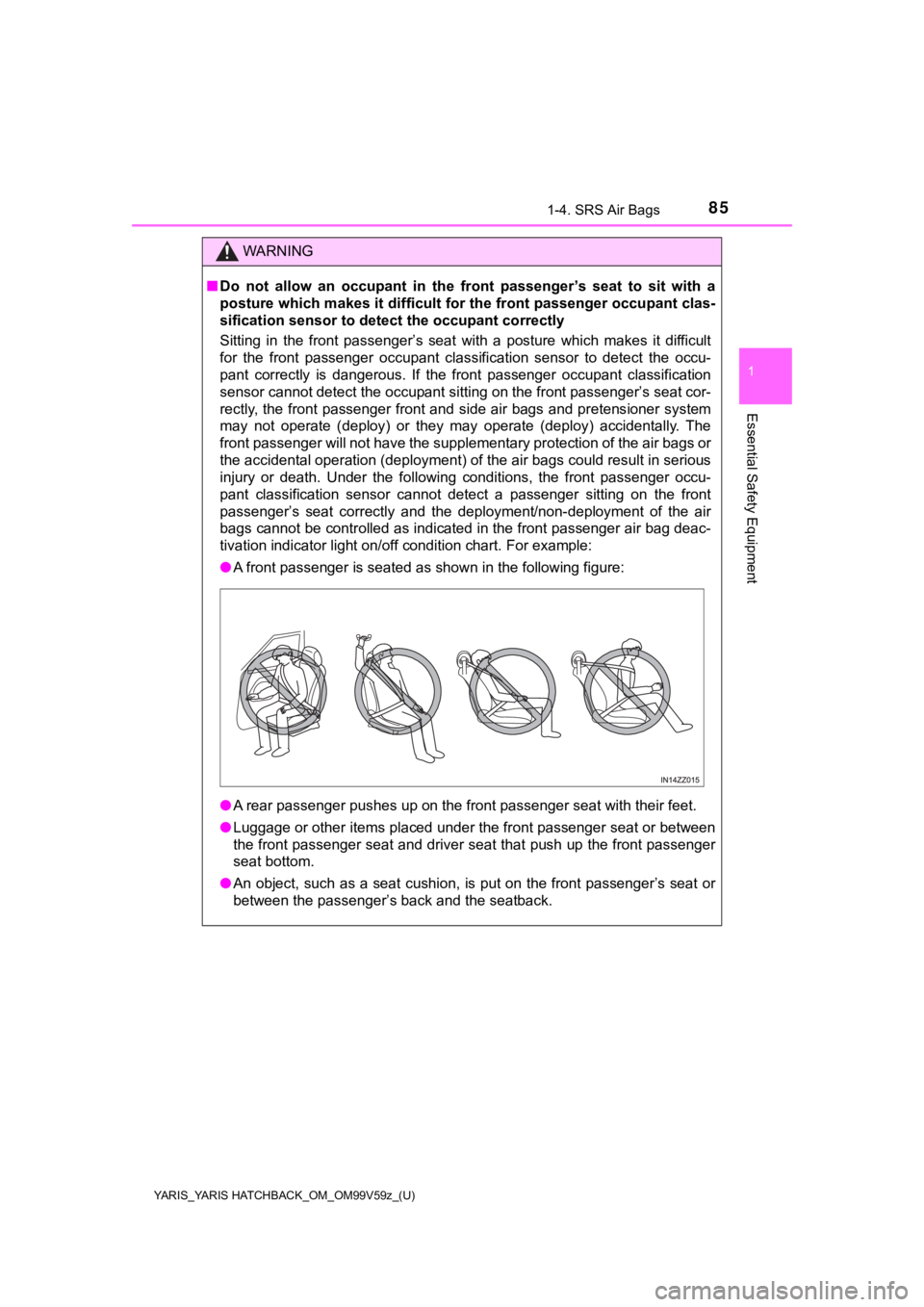
YARIS_YARIS HATCHBACK_OM_OM99V59z_(U)
851-4. SRS Air Bags
1
Essential Safety Equipment
WARNING
■Do not allow an occupant in the front passenger’s seat to sit w ith a
posture which makes it difficult for the front passenger occupa nt clas-
sification sensor to detect the occupant correctly
Sitting in the front passenger’s seat with a posture which make s it difficult
for the front passenger occupant classification sensor to detec t the occu-
pant correctly is dangerous. If the front passenger occupant classification
sensor cannot detect the occupant sitting on the front passenge r’s seat cor-
rectly, the front passenger front and side air bags and pretens ioner system
may not operate (deploy) or they may operate (deploy) accidenta lly. The
front passenger will not have the supplementary protection of t he air bags or
the accidental operation (deployment) of the air bags could res ult in serious
injury or death. Under the following conditions, the front pass enger occu-
pant classification sensor cannot detect a passenger sitting on the front
passenger’s seat correctly and the deployment/non-deployment of the air
bags cannot be controlled as indicated in the front passenger air bag deac-
tivation indicator light on/off condition chart. For example:
● A front passenger is seated as shown in the following figure:
● A rear passenger pushes up on the front passenger seat with their feet.
● Luggage or other items placed under the front passenger seat or between
the front passenger seat and driver seat that push up the front passenger
seat bottom.
● An object, such as a seat cushion, is put on the front passenge r’s seat or
between the passenger’s back and the seatback.
Page 86 of 572
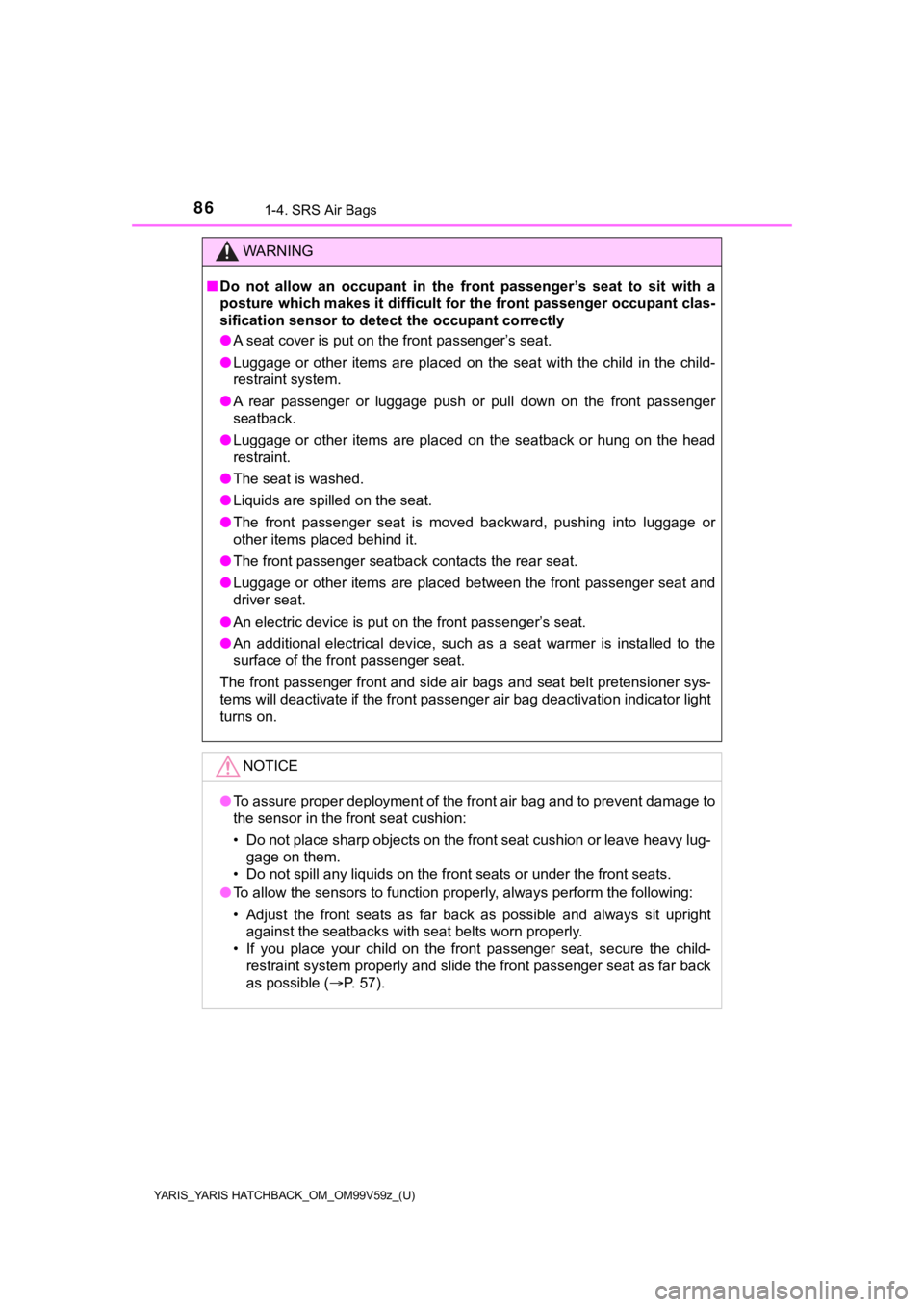
86
YARIS_YARIS HATCHBACK_OM_OM99V59z_(U)
1-4. SRS Air Bags
WARNING
■Do not allow an occupant in the front passenger’s seat to sit w ith a
posture which makes it difficult for the front passenger occupa nt clas-
sification sensor to detect the occupant correctly
● A seat cover is put on the front passenger’s seat.
● Luggage or other items are placed on the seat with the child in the child-
restraint system.
● A rear passenger or luggage push or pull down on the front pass enger
seatback.
● Luggage or other items are placed on the seatback or hung on the head
restraint.
● The seat is washed.
● Liquids are spilled on the seat.
● The front passenger seat is moved backward, pushing into luggag e or
other items placed behind it.
● The front passenger seatback contacts the rear seat.
● Luggage or other items are placed between the front passenger s eat and
driver seat.
● An electric device is put on the front passenger’s seat.
● An additional electrical device, such as a seat warmer is installed to the
surface of the front passenger seat.
The front passenger front and side air bags and seat belt prete nsioner sys-
tems will deactivate if the front passenger air bag deactivatio n indicator light
turns on.
NOTICE
● To assure proper deployment of the front air bag and to prevent damage to
the sensor in the front seat cushion:
• Do not place sharp objects on the front seat cushion or leave heavy lug-
gage on them.
• Do not spill any liquids on the front seats or under the front seats.
● To allow the sensors to function properly, always perform the f ollowing:
• Adjust the front seats as far back as possible and always sit upright
against the seatbacks with seat belts worn properly.
• If you place your child on the front passenger seat, secure th e child-
restraint system properly and slide the front passenger seat as far back
as possible ( P. 57).